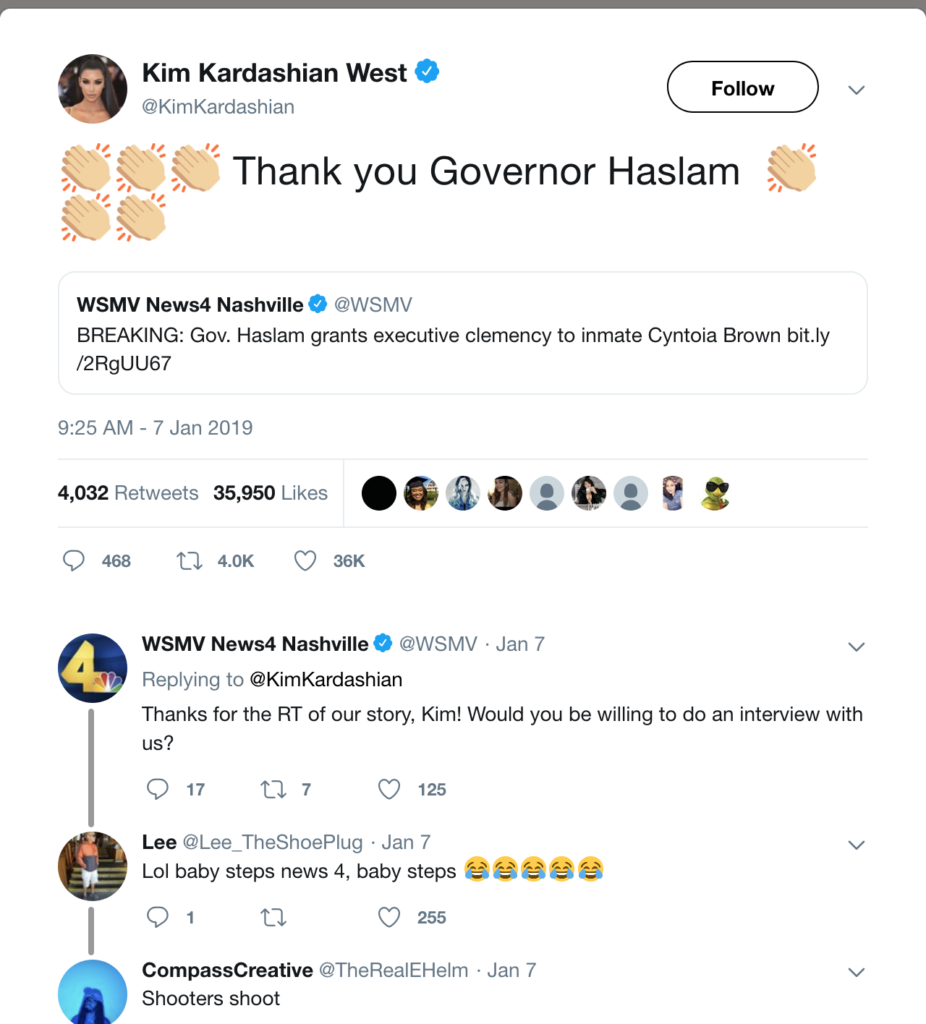Celebrities rallied around Cyntoia Brown, but some worry about ‘Kardashian effect’

“We hope that the same shot would be available to everyone … But the reality is we don’t live in that world,” said one defense attorney.
When Cyntoia Brown learned her fate this week — that Tennessee’s governor was granting her clemency from a life sentence for murder — she was backed by a brigade of powerful celebrities who for more than a year shared headlines about her with millions of people.
Rihanna, Drake, LeBron James and Kim Kardashian West were some of the big names who used social media to champion Brown, who as a teenage human trafficking victim was convicted in the 2004 fatal shooting of a man who had hired her for sex.

While Brown’s impending freedom might give renewed hope to prisoners who believe the criminal justice system has failed them, defense attorneys and legal experts worry that the advantage of celebrity endorsements might overshadow an already fraught process that finds many inmates at a disadvantage.
They’re cautious, they say, about a “Kardashian effect.”
“The celebrity piece in Cyntoia Brown’s case made people pay attention — it was a nice catalyst,” said Kevin Sharp, a former federal judge and Nashville attorney who is supporting Kardashian West on another case of a Tennessee man serving a life sentence.
“There are plenty of people who are sitting in prison cells and their stories need to be told,” Sharp added. “But garnering celebrity support can’t be how to gain influence with decision makers or ensure justice moves forward. I’d hate for that to be the only way.”
It’s unclear whether Tennessee Gov. Bill Haslam, who had been inundated with letters of support for Brown, closely regarded what celebrities were saying. In December, actresses Alyssa Milano and Amy Schumer directed tweets asking him to consider clemency for Brown as social justice organizations launched a week of action.
In a statement Monday announcing his decision, he made no mention of the high-profile advocates, saying instead that he had taken “careful consideration” to determine a life sentence was especially harsh on someone who committed her crime at 16.
The governor lauded Brown, now 30, for continuing her schooling during the past 15 years in prison and proving herself a model inmate. His decision comes after the Tennessee Board of Parole was divided last year over recommending an early release.
In his eight years as governor, Haslam, a Republican who leaves office next week, has granted only a handful of commutations. Brown’s attorneys told NBC News that her pending release, which is set for August, is “extraordinary” and “unusual.”
Similar widespread attention is what Ohio attorney Jennifer Kinsley would like for one of her clients, Alexis Martin. In 2013, Martin was 15 when prosecutors say she was involved in the robbery and murder of a man who forced her into human trafficking.
While Martin, who is currently serving 21 years to life, has gotten some attention from victims’ advocate groups, major celebrities have yet to amplify her situation.
If someone like Kardashian West wanted to use their platform, Kinsley said, “I would welcome it.”
Still, she’s wary about having to count on Hollywood A-listers to tip the scales toward Martin, whose case remains on appeal and is seeking clemency from outgoing Ohio Gov. John Kasich.
“We hope that the same shot would be available to everyone, and that all people would have the opportunity to be treated fairly regardless of circumstances,” Kinsley said. “But the reality is we don’t live in that world.”
Kardashian West, who has more than 124 million followers on Instagram, has become one of the most outspoken celebrity activists in criminal justice reform. Last June, she successfully lobbied President Donald Trump to commute the sentence of Alice Marie Johnson, a first-time nonviolent drug offender who was serving a life sentence on drug charges. Kardashian West reportedly paid for Johnson’s legal team.
Since then, the reality TV star has been flooded with letters from prisoners asking for her help, according to TMZ.
Sharp said celebrities might shine a spotlight on cases of injustice, but it’s still the lawyers, activists and journalists who should be credited with exposing an inequity.
In the case of Matthew Charles, a Nashville man whom Kardashian West mentioned in a tweet last week when he was freed from prison for a second time, Sharp noted that it was Nashville Public Radio that had been following his story long before he was made a cause célèbre. Sharp was the federal judge who had first ordered Charles released in 2016 following his 35-year sentence for selling crack and illegal gun possession.
Charles was released again under the Trump administration’s First Step Act, which eases mandatory-minimum drug sentences and could see thousands of inmates benefit.
Sharp said it’s clear that celebrity interest “gives you a leg up,” and that they are oftentimes the most effective way to spread a story. He added that through his dealings with Kardashian West, she has shown herself to be a “serious person” on the subject of criminal justice reform — and she shouldn’t be ignored.
“Why do we listen to celebrities on anything?” Sharp said. “Sometimes a story has to be told so that citizens can say, ‘Wait a minute, here’s a wrong that needs to be righted, so how do we right that?'”
Article via NBCNews

